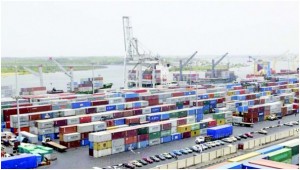W’Bank budgets N12.2bn to clear Apapa gridlock

The World Bank is to support Nigeria’s maritime sector with N12.2bn ($40m) to help clear the traffic congestion that characterises most roads around the Nigerian Ports Authority in Apapa, Lagos, the Nigerian Shippers Council has said.
According to the NSC, the National Freight Information and Transport Hub, an arm of the World Bank, is working with the NPA on how the funds will be used to clear the trucks and tankers that cause heavy gridlock at Apapa, Orile, Tin Can Island and other areas around the Lagos port complex.
The Executive Secretary, NSC, Mr. Hassan Bello, told journalists in Abuja during a press briefing that the move was aimed at making the NPA more efficient, adding that it would also ensure that oil pipelines were used to transport petroleum products instead of tankers.
He said, “No matter how efficient the terminal is, if you don’t have the road to evacuate cargo, how will you move your goods out of the ports? So, there must be an intervention and in that regard, the NSC has introduced the NAFITH to the NPA. Now, the NAFITH, an international finance corporation and an arm of the World Bank, is bringing $40m to put an end to the traffic situation in Apapa.
“The fund is meant to improve logistics around the Apapa, Tin Can and Orile areas for every time there are over 5,000 trucks on that axis. But what are they doing there? What we need is about 1,500 trucks in that Apapa vicinity logistically, but you find about 5,000. So, what are the other 3,500 trucks doing? They are doing nothing!
“So the idea is to have an electronic passage where a truck is in Apapa only when it is needed to pick or drop cargo. The tankers too don’t need to be there for the pipelines will do the transportation of products. The moment we have the pipelines pumping to Mosimi and other flow stations, then we don’t need the tankers in Apapa. So, all these things are what the World Bank is coming to do in order to solve, once and for all, the gridlock in Apapa.”
Bello noted that maritime sector was a formidable source for the diversification of the Nigerian economy.








